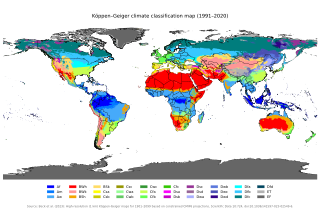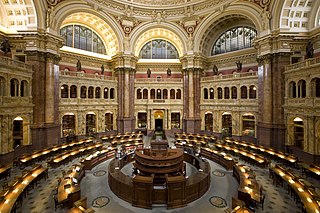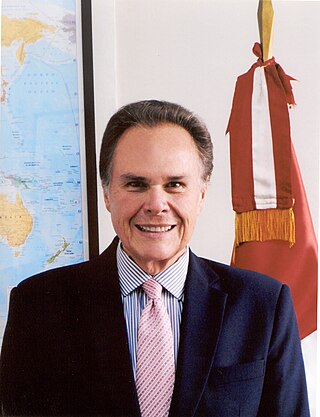The Library of Congress is the research library that officially serves the United States Congress and is the de facto national library of the United States.
Library of Congress may also refer to:

A congress is a formal meeting of the representatives of different countries, constituent states, organizations, trade unions, political parties, or other groups. The term originated in Late Middle English to denote an encounter during battle, from the Latin congressus.

The flag of Chile consists of two equal-height horizontal bands of white and red, with a blue square the same height as the white band in the canton, which bears a white five-pointed star in the center. It was adopted on 18 October 1817. The Chilean flag is also known in Spanish as La Estrella Solitaria.
Channel 5 most commonly refers to:

The Country Studies are works published by the Federal Research Division of the United States Library of Congress, freely available for use by researchers. No copyright is claimed on them. Therefore, they have been dedicated to the public domain and can be copied freely, though not all the pictures used therein are in the public domain. The Country Studies Series presents a description and analysis of the historical setting and the social, economic, political, and national security systems and institutions of countries throughout the world. The series examines the interrelationships of those systems and the ways they are shaped by cultural factors.

The Ibero-American Exposition of 1929 was a world's fair held in Seville, Spain, from 9 May 1929 until 21 June 1930. Countries in attendance of the exposition included: Portugal, the United States, Brazil, Uruguay, Mexico, Peru, Argentina, Chile, Colombia, Cuba, Venezuela, the Dominican Republic, Bolivia, Panama, El Salvador, Costa Rica, and Ecuador. Each Spanish region and each of the provinces of Andalusia were also represented.

The Köppen climate classification divides Earth climates into five main climate groups, with each group being divided based on patterns of seasonal precipitation and temperature. The five main groups are A (tropical), B (arid), C (temperate), D (continental), and E (polar). Each group and subgroup is represented by a letter. All climates are assigned a main group. All climates except for those in the E group are assigned a seasonal precipitation subgroup. For example, Af indicates a tropical rainforest climate. The system assigns a temperature subgroup for all groups other than those in the A group, indicated by the third letter for climates in B, C, D, and the second letter for climates in E. For example, Cfb indicates an oceanic climate with warm summers as indicated by the ending b. Climates are classified based on specific criteria unique to each climate type.

John Milton Niles was a lawyer, editor, author and politician from Connecticut, serving in the United States Senate and as United States Postmaster General 1840 to 1841.

The Peru–Bolivian Confederation was a short-lived state that existed in South America between 1836 and 1839. The country was a loose confederation made up of three states: North Peru and South Peru—states that arose from the division of the Peruvian Republic due to the civil wars of 1834 and 1835 to 1836—as well as the Bolivian State.
A health minister is the member of a country's government typically responsible for protecting and promoting public health and providing welfare spending and other social security services.

Pan-Americanism is a movement that seeks to create, encourage, and organize relationships, an association, and cooperation among the states of the Americas, through diplomatic, political, economic, and social means. The term Pan-Americanism was first used by the New York Evening Post in 1882 when referring to James G. Blaine’s proposal for a conference of American states in Washington D.C., gaining more popularity after the first conference in 1889. Through international conferences, Pan-Americanism embodies the spirit of cooperation to create and ratify treaties for the betterment in the Americas. Since 1826, the Americas have evolved the international conferences from an idea of revolutionary Simon Bolivar to the creation of an inter-America organization with the founding of the Organization of American States.

Basketball at the 1948 Summer Olympics was the second appearance of the sport of basketball as an official Olympic medal event. A total number of 23 nations entered the competition.

The Andean Parliament is the governing and deliberative body of the Andean Community, conformed by representatives of its four member states Bolivia, Colombia, Ecuador and Peru, and one associate member, Chile. It is composed of 25 parliamentarians, five representing each state.

The Badminton Pan Am (BPA) organisation is the governing body for the sport of badminton in the Americas and is recognized as such by the Badminton World Federation - BWF. It was founded as a continental governing body on February 13, 1976 in the headquarters of the Mexican Olympic Committee in Mexico City. The Pan American Badminton Confederation was founded by Badminton Canada, the Jamaica Badminton Association, Federacion Mexicana de Badminton, Comision Nacional de Badminton Peru and the United States Badminton Association. BPAC was founded in Mexico City in 1976 and had nominated Victor Jaramillo of Mexico as President until an official election was scheduled to take place at the first Pan Am Championships the following year. The first Badminton Pan Am Championships was held in Moncton, New Brunswick-Canada, in April 1977.

Vargas is a Spanish surname of Castilian origin. The founder of the house was Iván de Martin who fought as a knight in the reconquest of Madrid, in 1083, in the service of Alfonso VI of León and Castile.
A peace congress, in international relations, has at times been defined in a way that would distinguish it from a peace conference, as an ambitious forum to carry out dispute resolution in international affairs, and prevent wars. This idea was widely promoted during the nineteenth century, anticipating the international bodies that would be set up in the twentieth century with comparable aims.

The Library of Congress (LOC) is a research library in Washington, D.C., serving as the library and research service for the United States Congress and the de facto national library of the United States. It also administers copyright law through the United States Copyright Office.
Congress is a formal meeting of the representatives of different nations, constituent states, independent organizations, or groups.
The Baháʼí Faith in Peru begins with references to Peru in Baháʼí literature as early as 1916, with the first Baháʼís visiting as early as 1919. A functioning community wasn't founded in Peru until the 1930s with the beginning of the arrival of coordinated pioneers from the United States which progressed into finding national Peruvian converts and achieved an independent national community in 1961. The Association of Religion Data Archives estimated some 41,300 Baháʼís in 2010.

Harold Winston Forsyth Mejía is a Peruvian diplomat and former politician who has served as Peru's ambassador to the United States, Italy, Colombia, the People's Republic of China and Japan. From 1995 until 2000, he sat for one term in the Congress of the Republic of Peru.
Rank comparison chart of officers for navies of Hispanophone states.